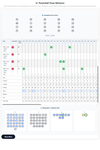Innovation and groundbreaking ideas that offer fresh perspectives keep the world turning. Especially with the increased speed of technological development in recent years, it seems humanity is constantly searching for efficient, accurate solutions that streamline time and energy-excessive processes. With the mantra ‘Knowledge is power’ in mind, Dr. Mingying Song founded Tylo, a deep-tech company providing innovation intelligence services.
Taking advantage of the wonders of the modern world, Tylo leveraged next-generation knowledge graphs and Artificial Intelligence (AI) algorithms to extract deep-linked and actionable insights from scientific papers and patents. The trailblazing company synthesized over 300 million academic texts, offering comprehensive insights that propel evidence-based business actions.
While scientific databases have been introduced decades ago, providing wide access to extensive knowledge, most of them focus on individual papers without linking the information and contents of each. That approach calls for a significant amount of knowledge and expertise, requiring businesses to read each text and extract essential information organically. Differentiating itself from the traditional way, Tylo doesn’t store full papers; instead, the team of experts decomposes scientific texts into paragraphs, sentences, and concepts, linking these small components across the database through their knowledge graph.
“We’re building a lot of vectors, and each vector contains a small chunk of information from the papers. By using this method, we can go in-depth into every text, analyze each sentence of over 300 million papers and patents globally, and link the information across different sources,” explained Song.
Although AI is a vital driving force behind Tylo, the company emphasizes that its technology varies significantly from the common Generative Artificial Intelligence. Unlike generative systems, Tylo doesn’t train AI models, relying on complex coding to generate unpredictable content. By designing an innovative knowledge graph powered by scientific data, Tylo extracts existing information and summarizes it with AI algorithms.
Moreover, Tylo’s technology simplifies the language of scientific texts, transforming it from highly technical terminology that’s industry-specific to an accessible and digestible form. As pointed out by Song, analyzing information is traditionally done by subject matter experts, who give businesses insights about technology trends, developments, and potential implications.
By applying AI technology, Tylo aims to make the complex process more cost and time-efficient, allowing more businesses, no matter their size, to access key information to make evidence-based decisions. Transforming a vast database into an AI-friendly knowledge graph also enables chat functionality, report generation, and quick access to various sources of wisdom. Depending on the amount of information, generating customized and in-depth insight reports takes 60 to 90 seconds on average, increasing to up to a few minutes if the selected data is exceedingly extensive.
Realizing how quickly the state of the world changes, Tylo updates its database weekly, mobilizing supreme accuracy validation. Aiming to solve issues with information access for people worldwide, Tylo’s technology is industry agnostic, enabling all executives to make informed, educated decisions.
“I created this technology for two reasons. Firstly, my previous career was in deep-tech innovation and Research and Development, and I noticed a tangible lack of solutions that would have made my former roles easier,” shared Song. “Secondly, I believe humanity has come to a point where technology can make my vision come true, and the R&D experiments Tylo performed showcased an impressive success rate.”
Although anyone can benefit from Tylo’s solution, the company gears towards business innovation and research teams on the corporate side. As explained by Song, they’re the ones who need accurate insights to improve their technology innovation processes. Additionally, through scrutinizing over 300 million papers and patents, Tylo enables innovation teams to connect with other developers who have published and patented similar ideas, minimizing the need to spend millions of dollars to push a product to the development phase.
“Our goal is reducing the cost and time of scrutinizing data, allowing business people who don’t have technical experience to access the scientific ocean easily,” added Song. “Committed to propelling natural language across databases, reducing the need to rely on experts, and streamlining innovation, we’re pushing the boundaries of applied AI technologies across various sectors and niches.”
Media Contact
Name: Dr. Mingying Song
Email: [email protected]






